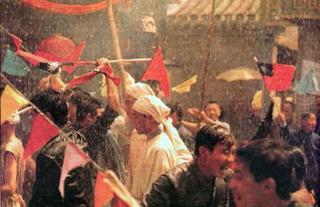1992
Chen's Farewell to Taboo

EXTRAVAGANT Peking Opera costumes, luxurious settings, heated exchanges both vocal and physical, and emotional outbursts - there is nothing typically Chen Kaige in the director's latest work, Farewell to My Concubine.
While outsiders may consider the epic drama a severe departure from his past efforts, Chen does not see it as such a great change. Still, the philosophical, almost metaphysical, approach he is renowned for in such films as Yellow Earth, The Big Parade, King of the Children and Cannes entry Life on a String, has been shunned for a spectacular period drama spanning 50 years.
Chen admits in the past he has cut down on dramatic effect to concentrate on theme, but he has always prided himself on being a good storyteller.
To illustrate this, Chen tells a familiar story. During the Cultural Revolution, he was sent to a village as a labourer. Every night, the other labourers would find excuses to gather round him to hear his fantastic tales, including Western stories such as the Count of Monte Cristo.
"Even when I'm working on a new subject matter, I'm still my old self in that my opinions on what constitutes a human being have not changed," Chen said.
"To put my ideas about the movie in a nutshell, it is a film about 'Dreams of a Glorious Past'. To represent such dreams, one must take a calculated, non-realist approach."
Based on a popular novel published in 1979 by Hongkong writer Lilian Li, the plot follows the lives of two Peking Opera singers, Cheng Dieyie (played by Leslie Cheung Kwok-wing) and Duan Xiaolou (Zhang Fengyi). The tale opens in 1977 when the two are already old, but flashes back to 1925 when they meet as children at an opera academy. There, under the harsh conditions, they forge an intense bond.
Cheng's girlish good looks make him a natural for female roles, then performed by men. The stalwart Duan, meanwhile, is trained to play warrior roles. As Cheng matures, the problem of his sexuality surfaces, compounded by his unrequited love for Duan.
The boys eventually perform a classic opera Farewell to My Concubine, with Cheng playing the concubine to Duan's lover and king. The tragic story has the concubine finally killing herself out of loyalty to the king who has lost everything to a rival.
Meanwhile, off-stage, Duan falls in love with a courtesan Ju Xian (played by Gong Li) and marries her, much to Cheng's dismay.
Through the Japanese occupation in the '40s and the Cultural Revolution in the '60s, their lives remain inextricably intertwined. Despite attempts to stay out of the turbulent political arena, the friends are forced to denounce each other during the purges to save themselves.
It was the theme of betrayal and loyalty that particularly spoke to Chen. The mutual denunciation of Cheng and Duan echoes Chen's experience during the revolution he was called on to betray his father.
Chen, haunted by that period, says the Cultural Revolution has affected him in a way nothing else has or will. "Chen especially found the story interesting because the betrayal is in contrast with the opera which is about loyalty," said Shu Kei, director of publicity.
Initially, when producer Hsu Feng invited Chen to direct the film, he declined. He found the book too superficial, especially the sections dealing with the revolution. "I've always thought Li's novel skimpy. There isn't any real development in the characters' relationship with one another. She didn't have a clear picture about the situation in China or Peking Opera per se," Chen said. "She also didn't have any gut feeling about the Cultural Revolution; she just wasn't there when it happened."
Hsu sent invitations to others, among them Ann Hui, who lobbied to get Jackie Chan to participate, Shu said.
Chan refused because of the film's homosexual theme, and objections from Golden Harvest saw the end to that idea. Hsu turned to Chen once more.
The mainland director consented after a marathon discussion with Li, and massive rewrites of the script. "It was only after quite a while that I found a fundamental concept I could build on, and that is ~ human beings don't stand up to tests," Chen said.
While Chan and Golden Harvest might have blatantly called the film's theme homosexual, Chen was more diplomatic. "Even the director is avoiding the word," Shu said. "He keeps denying the film is about it. He calls it a special kind of love. I think it is a taboo and sensitive subject matter in the context of film-making in China. "Basically, undeniably, the focus of the story is the love of two stage brothers," Shu said.
"Cheng is at once male and female. He's a theatre addict who can't distinguish between life and drama. He's a walking tragedy and all he wants is one little bit of beauty, to be the reincarnation of Ru Yi, the concubine," Chen said.
Although there are no explicit sex scenes in the film, the searing glances Cheng flashes Duan are undeniably those of a lover. "When they are adults, the whole theme of sexuality is oppressed," Shu said. "In opera circles, it is an open secret. It is never talked about, but understood."
Chen refuses to pigeonhole the complex film, which embraces ambivalence and duality of character. Finishing the final cut in Tokyo, all he would say was that it was not a simple film. "This is not a film about Peking Opera or Peking Opera actors, and it does not promote the art of Peking Opera. "After all, the character I set the greatest store by is Cheng."
Farewell to My Concubine opens in Hongkong or January 1, 1993.
South China Morning Post
 LeslieCheungCyberworld © 2024 , All Rights Reserved
LeslieCheungCyberworld © 2024 , All Rights Reserved

